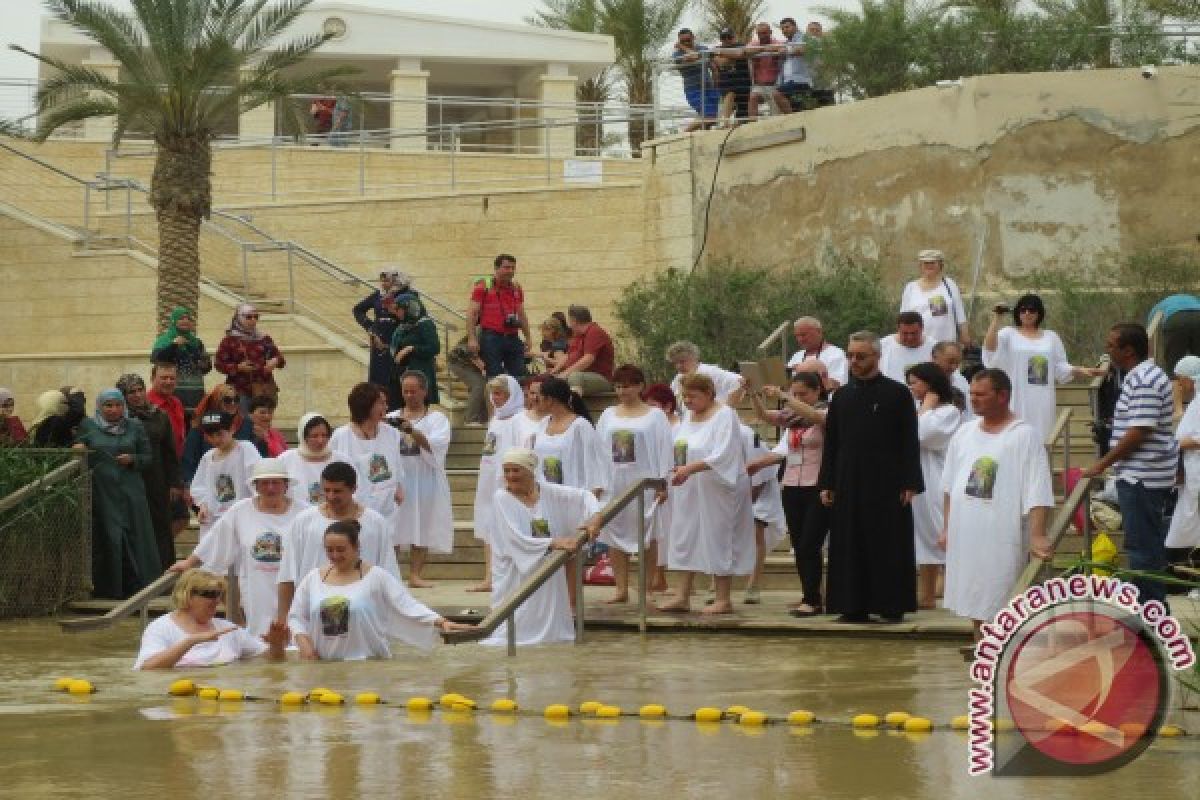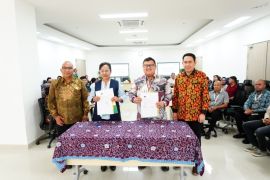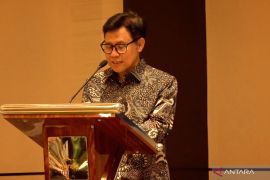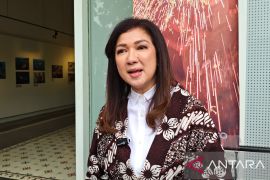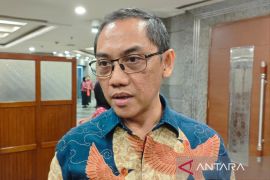"To Jordan, as a country that shares the sacred site of the river, peace and harmony were its genuine identity."Amman, Jordan (ANTARA News) - The Bible mentions the River Jordan in Amman, as the place where Jesus was baptized by John the Baptist thousands of years ago, and in modern times, it has become a pilgrimage destination for believers.
Flowing opposite to Jericho in Israel, from the heights of Mt Hermon to the depths of the Dead Sea, the River Jordan is akin to an oasis in the desert in the conflict-ridden area in the Middle East.
For almost over five decades, the conflict between Israel and Palestine has been the main cause of tensions in the Middle East, where the fighting is not only about the territory but also the claims for several sacred sites, which are actually owned by all Abrahamic religions.
Regardless, the River Jordan seems unaffected by the current tensions when we visited the sacred place, where Pope Benedict XVI had also paid a visit and has offered prayers for peace in 2009.
The Jordan Tourism Board invited some Indonesian journalists to visit the country in late March, when the Jordanians enjoy spring days with moderate temperatures ranging around 18 degrees Celsius, not too hot, even though the sun shone brightly.
Located in Jordan Valley, where the golden brown sands covered most of the landscape, some churches built by foreign funding such as the Anglican Church, the Catholic Church, the Armenian Church, the Coptic Church, and the Russian Pilgrims House, which according to our Jordanian guide Ramzi Nawafleh, vaguely depicted one nations domination over another.
Russia was one of the lucky countries to be able to build a church. Russia built the Epiphany Church, a small elegant chapel, which embodied the essence of the Russian Pilgrims House, right in front of the River Jordan gate, seemed set to utilize that opportunity to the fullest.
The Russians built a golden brown sand colored chapel bearing paintings and carvings that depict the story of the Baptism of Jesus. On top of the chapel was a golden dome, which was made to resemble the Dome of Rock in Israel, according to the guide.
"But, I do not know whether it is a genuine gold or not," Mr. Nawarleh jokingly said.
Entering the gate and walking through the long pavements lined with bougainvillea and dandelion plants, which connect one sacred site to another, it was similar to a journey to the past based on the Bibles version.
Some places at the site, however, had been converted to cater to tourists, such as when Pope Benedict XVI visited, they had to pump the water to the baptism pond, and during the usual days, it was dry.
Lying at the end of the sacred complex were the River Jordans banks, a narrow, quite stream with muddy waters that may not seem attractive, but as we moved our sights straight across the river, we were taken aback by the breathtaking views of Israel.
The first place where Jesus was baptized is also the border between Jordan and Israel, and it was very close, where people can just slide across a distance of less than four or five meters to reach the river banks in the Israeli territory, if they are daring enough to face the armed military guards stationed on both sides.
As most of the group members are Muslims (or so I thought), it was particularly exciting to witness dozens of people in white clothing lined up on the river bank on the opposite side and eagerly waiting to take a dip in the river, which is surrounded by rope to demarcate the territory between Israelis and Jordanians, after which they approached the priest who poured river water on their heads one by one.
Silently amused by the sacred procession of the Christian baptism, the Indonesian group stood still at the rivers dock on the Jordanian side until the last person took a dip in the water and met the priest.
One of the Jordanian military guards, Ahmed, explained to us that it was a common sight of a mass baptism similar to what we had earlier seen during the weekend or holidays, and it was always swarming throughout the year.
As though inspired by the scene we had just witnessed, a woman standing next to me suddenly expressed her intentions to be baptized too. Our guide then offered his service, and so, we held a baptism-like ceremony in a marble bowl near the banks as she refused to take a dip in River Jordan since it was muddy.
Back to the rivers bank, we sat still, engrossed in our own thoughts, when a group of men on the opposite side yelled "hello" and waved to us, and we reciprocated the gesture.
Separated by a small distance, we managed to hold small conversation in English, like "how are you" (fine), "where are you coming from?" (Indonesia), while the answers from the opposite side were "fine", "Hebron and we are Palestinians."
The information surprised us, as they were in the Israeli territory but loudly and proudly said that they were Palestinians. Excited by the cross-border conversation, we started inviting each other to come to the opposite sides, which of course, was a pun.
A military guard on the Israeli side armed with guns and posted as a tower guard would be ready to shoot down anyone who dares to swim across the river.
We noticed some other visitors on the opposite side. A group of women with Jewish veils took a dip in the water, while some other women wearing dark hijabs stood near the banks and engaged in a small conversation with us.
At that moment, some people could not fathom that a terrible and complicated problem exists between Israel and Palestine, and also the radicalism crisis in the Middle East caused by a terrorist group based in Iraq and Syria (ISIS).
What we witnessed from the banks of River Jordan on the Jordanian side was the opposite. There was peace among the people and the believers of several religions.
Even a boy whose mother was wearing a Jewish-styled veil waved and smiled to us, while some Muslim women were standing on the banks and watching them bathe in the river.
To Jordan, as a country that shares the sacred site of the river, peace and harmony were its genuine identity.
Jordan was not involved in the conflict between Palestine and Israel, not to mention with ISIS. However, Jordan was eventually affected, when a Jordanian pilot Muath al-Kaseasbeh was brutally murdered by the terrorist group.
The tragedy has affected the country to a certain extent, not only emotionally but also politically and economically, which was apparent by the decrease in the number of tourist arrivals to almost half as compared to last year.
However, what we saw that day at the banks of River Jordan had convinced us that Jordan was an oasis of peace amidst the tensions and conflict-ridden areas.
During the visit to His Majesty King Abdullah IIs country, we experienced first-hand that Jordan and its people were peace-loving.
The visit to the Jordan River had opened my eyes that no matter how difficult the situation is, the peoples outlook to peace will never change. With these thoughts, I sat down and prayed by the River Jordan.
(T.A060/A/KR-BSR/A014)
Reporter: Azizah Fitriyanti
Editor: Fardah Assegaf
Copyright © ANTARA 2015
